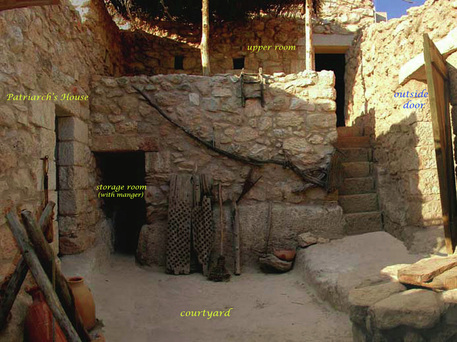[Greek] κατάλυμα (kataluma),[Latin hospitium], [Latin] diversorium, [Latin] refectionem, [Old English] inn: place to “loosen down”, lodge, lodging place, guest room, inn, guest chamber, camping area, oasis; Lk.2:7, Mk.14:14, Lk.22:11
No room in the urban lodging place or inn
Background Information:
Old Testament: This term means tent, tabernacle, dwelling place, guest room, lodging hall, abode, habitation, inn, and pasture. Hebrew culture stressed the importance of providing hospitality. Dwelling can also be illustrated by “tenting oneself”, “pitching a tent”, and “tabernaculing oneself”. This is essentially a place where one loosens (-luo) down (kata-). This term takes on the meaning of unloosing clothing and sandals, relaxing and unwinding, and untying (unyoking) animals.
New Testament: In the 2nd chapter of Luke’s gospel, the emperor Augustus Caesar decreed that everyone must be enrolled in the census in their place of birth. All those born in Bethlehem were required to return home. This included Joseph who was of the house and family of David. Scripture is silent about whether Joseph had relatives in Bethlehem and whether Joseph and Mary had stayed with them. Generally, it would have been considered an insult if one did not stay at their relatives’ place. However, there was no room for them in the inn. Perhaps, Joseph and Mary stayed at Joseph’s family’s rural location. It is important to note that this lack of background information does not take anything away from the importance of this infancy narrative. This notion makes sense in that this location (as opposed to an urban location) would have been readily accessible to the shepherds.
Inn: In this specific context, ‘inn’ refers to a lodging place (or guest quarters). Visitors would ordinarily stay in the guest quarters. Sometimes, visitors would have to stay in the storage room/animal quarters). A manger is essentially a stone or wood feeding trough used for animals. So the infant Jesus would be placed in this trough filled with hay. There are two specific Greek words for inn: kataluma (family lodging quarters) and pandocheion (an inn [motel] on the road). Luke would have known the difference between these terms. Luke references the Greek word pandocheion when the Good Samaritan paid for the victim’s lodging expenses at the inn (commercial establishment).
Scripture:
“She wrapped Him in swaddling clothes and laid Him in a manger, because there was no room in the inn.” Lk. 2:7
This room would have been the area used for guests. Wrapping the infant with swaddling clothes would have been the responsibility of the woman. In a prosperous household, a midwife would have assumed this task. Since Joseph and Mary were alone, Mary performed this task.
“Where is the guest room where I may eat the Passover with My disciples?” Lk. 22:1
This most likely would have been a guest room or dining room.
Conclusion:
Loose, loosen, inn, hospitality, diversion, refectory
At first glance I would have never thought that the word loose comes from this term. I would never connect loosing with relaxing. However, this makes sense when we unwind, unpack, loosen our sandals (and shoes), and relax when we finally arrive at our relatives’ house.
In the Old Testament, it is important to note that dwelling (and abiding) relate to “tenting” and “tabernaculing”. These are all different aspects of abiding. It is interesting to discover the historical Hebrew tradition of offering hospitality to one’s own relatives (and kinsfolk). It would also be an insult or affront to have to pay for such hospitality. So mostly likely those biblical “Best Westerns” and “Holiday Inns” would have been independently owned and operated by Gentiles.
In the New Testament, Jn.1:14 states that Jesus dwells among us. It can also be said that Jesus also “pitches His tent” and “tabernacles” among us.
Catholic perspective: It can also be said that Jesus “tabernacles” in Mary’s womb. Therefore, Mary can be called the Ark of the New Covenant. Jesus is also placed in the Tabernacle in Catholic churches. So Catholics can sit before Jesus.
We can imagine (and relate) to the hectic and chaotic situation of relatives heading back to Bethlehem at the same time for the census. Houses and homes are being filled up with kinfolk in Bethlehem. This almost sounds like a secular and historical precursor to our own Christmas holiday traveling. Yet, amazingly, Jesus’ birth later shortly follows!
The Old English word inn may have first appeared around 1200 A.D. The meaning for lodging house or residence for students is attested in the early 13th century.
When you celebrate Christmas at your relatives’ place, just be thankful that you won’t have to sleep with the animals (when they make room for you at their inn)!
